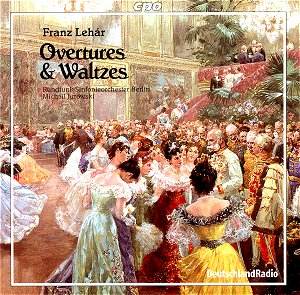CPO is in the process of recording a series of
the orchestral, operatic, vocal and instrumental works of Franz
Lehár. In addition there is a recording of a complete concert
conducted by Lehár himself, which was recorded in Saarbrucken
in 1939. CPO are doing the composer proud. The majority of these
recordings have been produced as co-productions between CPO and
various German radio organisations. Previous issues of orchestral
works have concentrated on unusual repertoire by the composer,
whereas this one primarily contains music for which the composer
is best known: music for the dance hall, with three overtures
thrown in for good measure.
Michail Jurowski has the full measure of these
works, and he produces a natural ebb and flow, with a distinctly
Viennese character. He is aided and abetted by an orchestra with
a long and distinguished history of playing this kind of music
(remember Strauss waltzes under Ferenc Fricsay). Allied to this,
we also have a recording quality that is up to excellent broadcasting
standard, thus making this a highly desirable issue.
Die lustige Witwe (The Merry Widow) operetta
has been recorded many times by many famous conductors as well
as by some who are not so famous. The overture has not been so
lucky. This is due to the fact that Lehár wrote it much
later in his life for a production of the operetta in 1940 in
Vienna, some 35 years after the first performance. This was to
celebrate the composerís seventieth birthday. For this occasion,
he surpassed himself, writing an extended full scale miniature
masterpiece, made up from themes from the main work, but subjected
to extensive modification and to instrumentation that was extremely
advanced.
Altwiener Liebeswalzer (Old Vienna Love Waltz)
evokes memories of the good old days in Vienna. It was renamed
by the publishers as Aus der guten alten zeit (from the good old
days). Lehár recalls the great Viennese waltz The Blue
Danube, although in his hands the disillusionment manifests
itself in that the Danube is now grey.
Gottergatten, or (Divine Spouses) is an operetta
overture written in Lehárís normal vein for this kind of
piece. It is a simple pot-pourri of themes from the operetta including
a whole section lifted from the finale. The plot includes Jupiter
and Mercury, in disguise, attempting to seduce their respective
wives. This obviously causes much confusion, which is the mainstay
of such dramatic works.
Wilde Rosen was originally entitled Chrysanthemum
Waltz, and was Lehárís next to last work in this form.
It is shorn of its slow Straussian introduction and launches straight
into the action. It is no longer a traditional waltz, but a three
part rondo, with the third interval chains of the legato middle
section pointing to Boston.
The overture to Clo-Clo is a another pot-pourri
of themes from the operetta. It is very straightforward, proving
once again the composerís mastery of the form. Unfortunately,
by 1924, this type of work was on the wane.
The last two pieces on this excellent disc are
waltzes in the traditional manner. Grutzner Walzer is unique in
that it was never published and has not been performed many times
since it was written. This is doubly strange in that almost everything
that the composer produced was snatched from his pen, almost before
the ink was dry.
Adria Walzer (Adriatic Waltz) is one of Lehárís
more conventional waltzes, but in common with some of his other
works in this guise, there is no slow introduction. The waltz
launches immediately into the action, sounding as though Bohemia
was visiting the seaside.
You will have gathered that I have enjoyed this
disc very much, and that I can recommend it without qualification.
If I have spent more time concentrating upon the works themselves
rather than the performances, this should be taken as confirmation
that I have no qualms whatsoever about the interpretations, the
playing or the recording.
John Phillips
